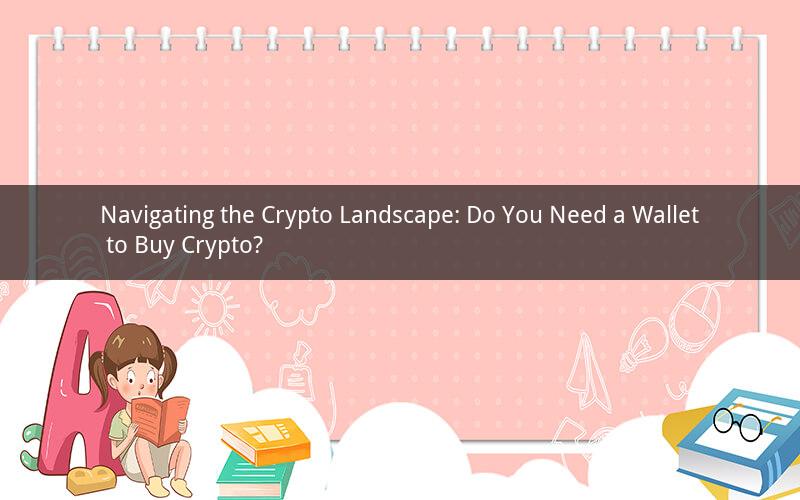
In the rapidly evolving world of cryptocurrencies, one question frequently arises: do I need a wallet to buy crypto? The answer is not as straightforward as it may seem, as it depends on various factors. This article delves into the different types of wallets, their functionalities, and the importance of having one when buying crypto.
1. What is a crypto wallet?
A crypto wallet is a digital tool used to store, send, and receive cryptocurrencies. It serves as a virtual bank account, allowing users to manage their digital assets securely. There are various types of wallets, each with its own set of features and security levels.
2. Types of crypto wallets
a. Hardware wallets: These are physical devices designed to store cryptocurrencies offline, providing enhanced security against hackers and cyber attacks. Hardware wallets are considered one of the safest options for storing large amounts of crypto.
b. Software wallets: These are digital applications that can be installed on your computer or smartphone. Software wallets are more accessible and convenient, but they may be vulnerable to malware and hacking attempts.
c. Mobile wallets: These are mobile applications that allow users to manage their crypto assets on their smartphones. Mobile wallets are convenient for daily transactions but may not offer the same level of security as hardware wallets.
3. The importance of a wallet when buying crypto
a. Secure storage: A wallet is essential for storing your crypto assets safely. Without a wallet, you risk losing your investments due to theft or technical failures.
b. Transaction management: A wallet enables you to send and receive cryptocurrencies easily. It provides a record of all your transactions, making it easier to track your assets.
c. Access to decentralized exchanges: Many decentralized exchanges (DEXs) require users to have a wallet to participate in trading. Without a wallet, you may miss out on the benefits of using DEXs, such as lower fees and increased privacy.
4. Can I buy crypto without a wallet?
Technically, you can buy crypto without a wallet by using a third-party service, such as a cryptocurrency exchange. However, doing so may expose you to certain risks and limitations:
a. Security concerns: When buying crypto through an exchange, your funds are stored in the exchange's wallet, which may not be as secure as a personal wallet. This puts your assets at risk if the exchange is hacked or experiences technical issues.
b. Limited control: By using an exchange, you give up control over your crypto assets. The exchange can freeze or seize your funds if they suspect fraudulent activity or if they go out of business.
c. Higher fees: Exchanges often charge higher fees for buying and selling crypto compared to using a personal wallet. This can significantly impact your investment returns.
5. Frequently asked questions
Question 1: What is the best type of wallet for beginners?
Answer: For beginners, a mobile wallet is often the best choice due to its ease of use and accessibility. However, ensure you choose a reputable and secure mobile wallet provider.
Question 2: Can I use a regular bank account to buy crypto?
Answer: Yes, you can use a regular bank account to buy crypto through many exchanges. However, you may need to verify your identity and wait for the funds to be transferred before purchasing crypto.
Question 3: Is it safe to use a web wallet for storing large amounts of crypto?
Answer: No, it is not recommended to store large amounts of crypto in a web wallet. Web wallets are more susceptible to hacking and cyber attacks. Consider using a hardware wallet for secure storage of significant investments.
Question 4: Can I use the same wallet for all types of cryptocurrencies?
Answer: Some wallets support multiple cryptocurrencies, but it's essential to ensure the wallet you choose is compatible with the specific crypto you want to buy. Using a wallet that supports a wide range of cryptocurrencies can be convenient, but prioritize security and compatibility.
Question 5: How can I protect my wallet from hacking?
Answer: To protect your wallet from hacking, follow these best practices:
a. Use strong, unique passwords for your wallet and any associated accounts.
b. Keep your wallet software updated to the latest version.
c. Avoid using public Wi-Fi networks when accessing your wallet.
d. Enable two-factor authentication (2FA) for your wallet and any related accounts.
e. Regularly back up your wallet to a secure location, such as an external hard drive or cloud storage service.
In conclusion, while it is possible to buy crypto without a wallet, using a wallet is highly recommended for secure storage, transaction management, and access to decentralized exchanges. Choose the right type of wallet based on your needs, security concerns, and investment goals. Always prioritize security and follow best practices to protect your digital assets.